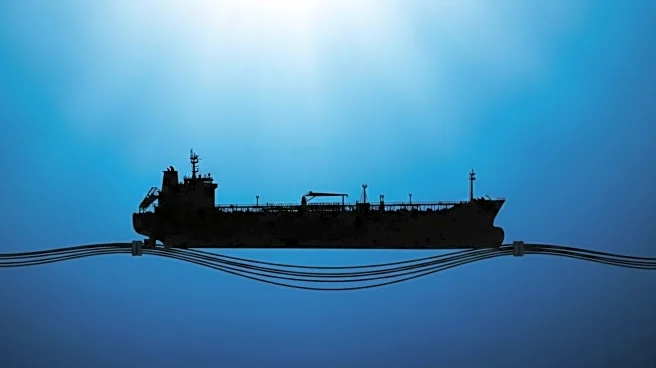What's Happening?
A court in Helsinki has ruled that it lacks jurisdiction in the case involving the Eagle S oil tanker, whose crew was accused by the Finnish government of deliberately damaging subsea cables. The incident occurred late last year, and the defendants argued that the alleged crimes took place before the ship entered Finnish territorial waters. The Eagle S, flagged in the Cook Islands, is suspected to be part of Russia's 'shadow fleet' of ships evading sanctions. The Finnish state may now be required to cover the defendants' legal fees, which could amount to approximately €200,000 (US$234,000). This case has broader implications for intercontinental connectivity, as subsea cables are critical infrastructure for global communications.
Why It's Important?
The ruling highlights jurisdictional challenges in international maritime law, particularly concerning actions taken outside territorial waters. Subsea cables are vital for global internet and communication networks, and their damage can disrupt services and economic activities. The case underscores the complexities of enforcing legal accountability in international waters, especially when involving ships linked to nations under sanctions. The potential financial burden on Finland to cover legal fees further complicates the situation, raising questions about the enforcement of maritime laws and the protection of critical infrastructure.
What's Next?
The Finnish government may need to reassess its approach to maritime jurisdiction and international cooperation in protecting subsea cables. This could involve diplomatic efforts to establish clearer international protocols for handling such incidents. Additionally, the case may prompt other nations to review their maritime laws and strategies for safeguarding critical infrastructure against potential threats from sanctioned entities. The outcome could influence future legal frameworks and international agreements on maritime security and infrastructure protection.
Beyond the Headlines
The case raises ethical and legal questions about the responsibilities of nations in protecting global communication networks. It also highlights the potential for geopolitical tensions to impact infrastructure security, as nations under sanctions may resort to clandestine operations. The incident could lead to increased scrutiny of ships suspected to be part of 'shadow fleets,' potentially affecting international shipping and trade relations.









